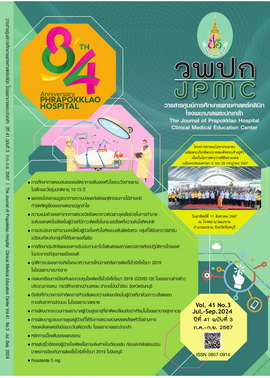Evaluation of Renal Function in Patients with Atrial Fibrillation who Received Warfarin Compared with Aspirin
Main Article Content
Abstract
BACKGROUND: Aspirin is a drug commonly chosen to prevent strokes in patients with atrial fibrillation (AF) and those who are unable to receive warfarin, which the drug of choice. In the past, reports showed that both drugs had side effects on kidney function, but there have been no studies comparing the effects on kidney function in patients taking these drugs.
OBJECTIVE: This study aimed to evaluate kidney function in a group of patients with AF who received aspirin compared with a group that received warfarin.
METHODS: This retrospective study examined 360 AF patients treated at Phrapokklao Hospital, who were divided into 2 groups comprising 1 group of 24 patients who received aspirin and another group of 336 patients who received warfarin. To assess the renal function of the patients during a 1-year period of receiving the drug, the glomerular filtration rate (GFR) utilizing the dependent t-test and independent t-test were used, while various factors were analyzed using logistic regression.
RESULTS: In a 1-year period, the mean GFR of the patients in the warfarin group increased by 3.9 ml/min/1.73m² (95%CI 2.87-4.96) compared to the aspirin group, which decreased by 8.0 ml/min/1.73m² (95%CI (-10.30)-(-5.72)). The percentage change in GFR of the warfarin group increased by 11.9% (95%CI 7.98-15.87) more than the aspirin group (p<0.001). When using logistic regression for univariate analysis and multivariate analysis, it was found that the aspirin group had a 10% chance of a decrease in GFR compared to patients receiving warfarin with a crude odds ratio=14.33, p<0.001, 95%CI 5.84-35.16 and adjusted odds ratio=149.9, p=0.003, 95%CI 5.70-3,940.05.
CONCLUSION: In a 1-year period, AF patients who received aspirin were 10 percent or more likely to experience deterioration in kidney function compared with patients who received warfarin.
Thaiclinicaltrials.org number, TCTR20240509001
Article Details

This work is licensed under a Creative Commons Attribution-NonCommercial-NoDerivatives 4.0 International License.
References
Apiyasawat S. Patients with atrial fibrillation [Internet]. 2013 [Cited 2023 Apr 20]. Available from: https://www.rama.mahidol.ac.th/med/sites/default/files/public/pdf/medicinebook1/atrial%20fibrillation.pdf
Hindricks G, Potpara T, Dagres N, Arbelo E, Bax JJ, Blomström-Lundqvist C, et al. 2020 ESC guidelines for the diagnosis and management of atrial fibrillation developed in collaboration with the European association for cardio-thoracic surgery (EACTS): the task force for the diagnosis and management of atrial fibrillation of the European society of cardiology (ESC) developed with the special contribution of the European heart rhythm association (EHRA) of the ESC. Eur Heart J 2021;42:373–498.
Posch F, Ay C, Stöger H, Kreutz R, Beyer-Westendorf J. Exposure to vitamin k antagonists and kidney function decline in patients with atrial fibrillation and chronic kidney disease. Res Pract Thromb Haemost 2019;3:207-16.
Golla A, Goli R, Nagalla VK, Kiran BV, Raju DSB, Uppin MS. Warfarin-related nephropathy. Indian J Nephrol 2018;28:378-81.
Dharmasaroja P. Atrial fibrillation: stroke neurologist perspective. Journal of Thai Stroke Society 2019;13:54-61.
Pastori D, Pignatelli P, Perticone F, Sciacqua A, Carnevale R, Farcomeni A, et al. Aspirin and renal insufficiency progression in patients with atrial fibrillation and chronic kidney disease. Int J Cardiol 2016;223:619-24.
CharnowJ A. Long-term aspirin use may lower CKD progression risk. [Internet]. 2016 [Cited 2016 Oct 25]. Available from: https://www.renalandurologynews.com/news/90-days-or-more-aspirin-use-found-to-slow-progression-of-chronic-kidney-disease/
Seil Oh. Warfarin versus aspirin in patients with atrial fibrillation and chronic kidney disease [Internet]. 2016 [Cited 2016 Oct 25]. Available from: https://clinicaltrials.gov/study/NCT01668901
Prabmeechai N. Introduction to applied biostatistics for medical research using STATA. Bangkok: Parbpim; 2017.
Muangpaisan T, Tajatiamjan S, Manyanon W. Evaluated the changes of renal function in chronic kidney disease patients who regularly used non-steroidal anti-inflammatory drug after 1 year drug withdrawal compared with control chronic kidney disease. Journal of the Department of Medical Services 2017;42(3):52-6.
Naidoo S, Meyers AM. Drugs and the kidney. S Afr Med J [Internet]. 2015 [Cited 2015 Mar 7];105(4):2683. Available from: http://www.samj.org.za/index.php/samj/article/view/9537/6647
Acquah F, Ganta N, Alnabwani D, Alaan C, Anantharaman P, Cheriyath P. Warfarin-related nephropathy manifested as diffuse mesangial proliferative glomerulonephritis. Cureus [Internet]. 2022 [Cited 2022 Feb 16];14(2):e22284. Available from: https://www.ncbi.nlm.nih.gov/pmc/articles/PMC8933143/pdf/cureus-0014-00000022284.pdf
Bento CP, Soares M, Molin C, Martins L, Martins J, Mazza M, et al. Case report: end stage renal disease in a chronic kidney patient on warfarin therapy. J Bras Nefrol 2015;37:275-8.

